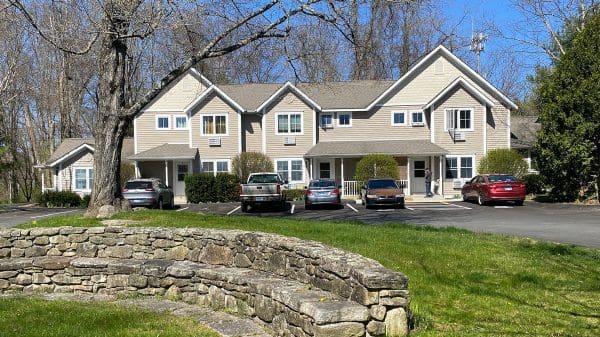KENT—A Housing Affordability Summit was held this week at the Warren Town Hall, sponsored by the Litchfield County Center for Housing Opportunity (LCCHO). It was attended by different housing organizations representing 15 towns in Litchfield County served by LCCHO, with Kent sending the largest contingent of delegates.
All three Kent candidates for first Selectman attended the program, which saw delegates give brief overviews of the projects they have underway. Kent Affordable Housing (KAH) President Justin Potter shared Kent’s proposal to add 10 units to the 24 units already at South Common by transforming two acres of town land next to Kent Common and the transfer station. This plan is being brought to Kent voters in the upcoming months.
Connecticut Department of Housing Commissioner Seila Mosquera-Bruno was the keynote speaker, sharing an overview of the funding challenges facing volunteer groups trying to establish safe, secure housing for all.
Mosquera-Bruno noted that more than 3,000 housing units are under construction in the state and that more money has come to Litchfield County than any other county “because you know how to organize volunteers and that is the only way we are going to do this.”
Eight hundred million dollars has been designated in the state’s biennial budget for affordable housing over the next two years. The funding will help address the pressing need for affordable housing, will support first-time homebuyers with down payment assistance, promote home ownership for low-to-moderate income families and improve living conditions at large apartment complexes.
But, she warmed, “We need to be efficient in our process.” She urged her listeners to “be a little creative,” when looking at projects and to find ways, such as a single application form for multiple projects to smooth the selection of occupants. “We have all these applications to process, and we don’t have the staff. This is the type of thing we can do because we have so much work.”
Carla Angevine of Warren, representing Hartford Health Care/Charlotte Hungerford Hospital, pressed the point that “housing has everything to do with health,” saying “poorer health outcomes are associated with poorer housing. When you look at households that pay more than 30 percent of their income for housing, you see health declines.”
She cited the difficulty of transportation in the rural area and food insecurity as other stressors for residents. “If you are paying 50 to 75 percent of your income for housing, you can’t afford to go to the doctor’s or pay for prescriptions. If you are living with lead paint, you can’t afford to move. It affects health.”
Not all of those needing housing are unemployed or under-employed. She said she knows full-time employees in the health industry who can’t afford a place to live in Litchfield County.
State Rep. Maria Horn noted the need for affordable housing to maintain healthy communities, saying, “It is painful to see families who have lived here for generations, who have provided generations of [community] volunteers, that are increasingly being priced out” of the housing market.
“As chairman of the Finance Committee, I want to see more projects with housing on them,” she declared.
It was noted that one additional population to address is seniors, many of whom need housing units where they can age in place in their hometowns.
Jocelyn Ayers, director of Litchfield County Center for Housing Opportunity, said the center works with towns to implement housing plans. “We’re working with 15 local housing organizations, doing shared project management to move things along as quickly and smoothly as we can.”
She reported that 143 new housing units could start construction in 2024 and that 75 units have been added in the last year alone.






























